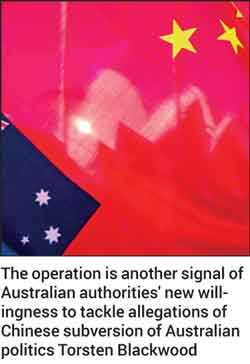Tuesday Feb 17, 2026
Tuesday Feb 17, 2026
Saturday, 27 June 2020 00:00 - - {{hitsCtrl.values.hits}}
 SYDNEY, (AFP): Australia’s spy agency and police raided a lawmaker’s home Friday as they probed alleged Chinese influence operations and Prime Minister Scott Morrison warned the country would not tolerate foreign political interference.
SYDNEY, (AFP): Australia’s spy agency and police raided a lawmaker’s home Friday as they probed alleged Chinese influence operations and Prime Minister Scott Morrison warned the country would not tolerate foreign political interference.
The developments added to months of escalating tensions between the two nations, partly driven by Australia accusing China of economic ‘coercion’ and raising concerns over espionage.
Security agents on Friday searched properties linked to New South Wales state legislator Shaoquett Moselmane, who has long faced allegations of links to the ruling Chinese Communist Party.
Shortly after the dawn raid the Australian Security Intelligence Organisation told AFP that “search warrant activity is occurring in Sydney as part of an ongoing investigation”. They added that there was no “specific threat to the community”.
Speaking after the raid, Morrison said Australia would “stand up” to any attempt at foreign interference.
“The threats in this area are real, the need to take action is necessary,” Morrison said. “We won’t cop anyone coming and seeking to interfere in our political system.” Moselmane’s pro-Beijing positions and contact with party officials have long raised eyebrows even among colleagues in his centre-left Labor Party, which scrambled to contain the political fallout.
New South Wales party leader Jodi McKay said she was informed about the operation on Moselmane’s home and office and said she had begun the process of suspending his party membership.
“It’s dreadfully concerning,” she said. “It’s important that every MP focuses on the people in their state.” Moselmane has publicly praised Chinese President Xi Jinping’s “unswerving” leadership during the coronavirus pandemic, contrasting it favourably with Australia’s own response.
Local media have reported he hired a staffer who trained at Beijing’s Chinese Academy of Governance, a school of party members going into public office, and made almost a dozen trips to China.
Some political foes had dubbed him “the member for Beijing”.
The operation is a signal of Australian authorities’ new willingness to tackle allegations of Chinese subversion of Australian politics and is likely to raise the temperature in an already fractious relationship between Beijing and Canberra.